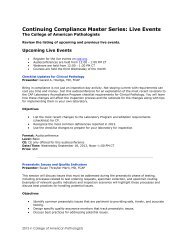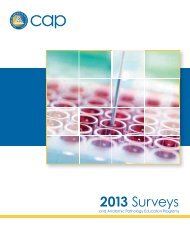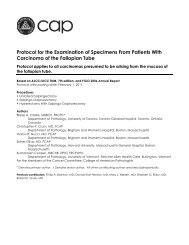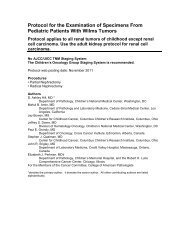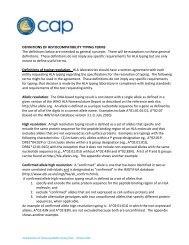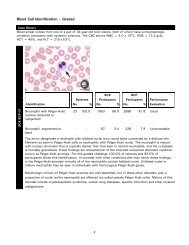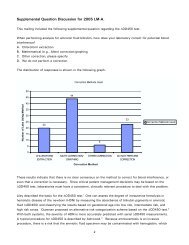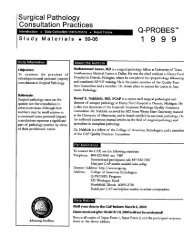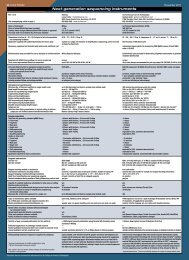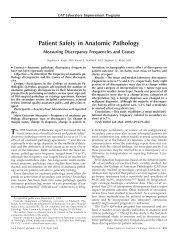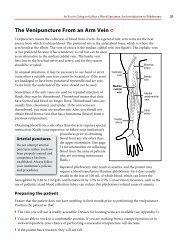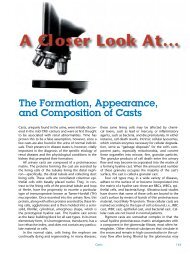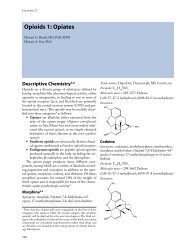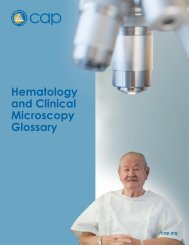POET REPORT - College of American Pathologists
POET REPORT - College of American Pathologists
POET REPORT - College of American Pathologists
Create successful ePaper yourself
Turn your PDF publications into a flip-book with our unique Google optimized e-Paper software.
<strong>POET</strong> <strong>REPORT</strong><br />
Perspectives on Emerging Technology<br />
KRAS Testing for Colorectal cancer<br />
September, 2009<br />
Developed by the CAP’s Technology Assessment Committee<br />
<strong>College</strong> <strong>of</strong> <strong>American</strong> <strong>Pathologists</strong><br />
325 Waukegan Rd.<br />
Northfield, IL 60093<br />
Tel: 800-323-4040<br />
www.cap.org<br />
Version no. 4
KRAS Testing for Colorectal Cancer | CAP Page 2<br />
THE PATHOLOGIST’S MESSAGE<br />
The importance <strong>of</strong> companion-test molecular assays for oncologic treatment decisions is on the rise.<br />
These tests are used to determine if patients are eligible to receive a targeted therapy. In the case <strong>of</strong><br />
KRAS testing for colorectal cancer, the intent is to avoid unnecessary toxicity and monetary costs for<br />
patients who are not likely to respond to anti-EGFR therapies, by screening them prior to initiating<br />
therapy.<br />
KRAS mutations can be detected in approximately 30-40% <strong>of</strong> all patients with CRC. Although no level I<br />
evidence* has been published, multiple studies with strong level II evidence have convincingly shown<br />
that patients with KRAS mutations in codons 12 or 13 do not benefit from anti-EGFR therapy with<br />
cetuximab or panitumumab. In contrast, about 40% <strong>of</strong> patients with metastatic colorectal cancer<br />
unresponsive to other therapies, and who lack a KRAS mutation, show a partial response with these<br />
agents. These findings suggest that only patients without KRAS mutations should be eligible to receive<br />
these therapies. See the ASCO Provisional Clinical Opinion www.asco.org/pco/kras.<br />
Pathologist expertise is essential to quality KRAS testing and effective metastatic CRC patient treatment<br />
determination for the following reasons.<br />
Identification <strong>of</strong> the right cells for assay analysis. KRAS mutations are detected on DNA from tumor<br />
sections. A pathologist’s evaluation <strong>of</strong> the tissue section used for DNA extraction is required to<br />
ensure that tumor cells are present in the specimen and that tumor cells are present in adequate<br />
quantity/concentration for the KRAS test that is utilized by the lab.<br />
Consultation with oncologists and other members <strong>of</strong> the treatment team. The pathologist can<br />
assist oncologists in the appropriate use <strong>of</strong> this test and guide the interpretation <strong>of</strong> results. Even if<br />
local pathologists are not performing the test in their own laboratory, they should understand the<br />
clinical significance <strong>of</strong> KRAS test results.<br />
Reference laboratory selection. <strong>Pathologists</strong> who utilize reference laboratories for this testing should<br />
be able to carefully evaluate the KRAS testing technology utilized and quality processes employed<br />
to ensure confidence in the results.<br />
Technology selection. Directors <strong>of</strong> molecular diagnostic laboratories will need to determine the best<br />
method for KRAS mutation detection in their environment.<br />
*Note: Levels <strong>of</strong> evidence in the literature are based on the classification developed by the U.S.<br />
Preventive Services Task Force. 1996. Guide to Preventive Services. 2d ed. Baltimore, MD: Williams and<br />
Wilkens. According to this classification, the quality <strong>of</strong> evidence can be scored as follows:<br />
(http://www.ncbi.nlm.nih.gov/books/bv.fcgi?rid=hstat3.section.17745)<br />
Copyright 2011. <strong>College</strong> <strong>of</strong> <strong>American</strong> <strong>Pathologists</strong>. All rights reserved.
KRAS Testing for Colorectal Cancer | CAP Page 3<br />
I. Evidence obtained from at least one properly designed randomized controlled trial.<br />
II-1. Evidence obtained from well designed controlled trials without randomization.<br />
II-2. Evidence obtained from well-designed cohort or case-controlled analytic studies, preferably from<br />
more than one center or research group.<br />
II-3. Evidence obtained from multiple time series with or without the intervention.<br />
III. Opinions <strong>of</strong> respected authorities, based on clinical experience, descriptive studies, or reports <strong>of</strong><br />
expert committees.<br />
CLINICAL CONTEXT<br />
In the United States, an estimated 108,070 cases <strong>of</strong> colon and 40,740 cases <strong>of</strong> rectal cancer are<br />
expected to occur in 2008. Colorectal cancer is the third most common cancer and the second most<br />
common cause <strong>of</strong> cancer related deaths. An estimated 49,960 deaths from colon and rectum cancer<br />
are expected to occur in 2008, accounting for almost 9% <strong>of</strong> all cancer deaths.<br />
Epidermal growth factor receptor (EGFR) has been validated as a therapeutic target in several human<br />
tumors. Recently, there has been a fair amount <strong>of</strong> interest in the role <strong>of</strong> anti-EGFR therapies in the<br />
treatment <strong>of</strong> CRC. EGF, as well as several other ligands, activates the cascade <strong>of</strong> RAS/RAF/MAPK, STAT,<br />
and PI3K/AKT signaling pathways when occupying the EGFR. The downstream effects <strong>of</strong> the activation<br />
influence cellular proliferation, adhesion, angiogenesis, migration, and survival.<br />
This EGFR signaling pathway has received much attention for new drug development during the past 5-<br />
10 years because it is overexpressed in more than 85% <strong>of</strong> tumors from patients with metastatic<br />
colorectal cancer (mCRC). Two relatively new anti-EGFR targeted antibodies, cetuximab and<br />
panitumumab, have shown promising activity as second-line therapy for mCRC and are used as first line<br />
therapy in combination with Oxaliplatin and Irinotecan. Cetuximab (Erbitux ® ) was developed by<br />
Imclone and introduced in 2004. Panitumumab (Vectibix ® ) was developed by Amgen and introduced<br />
in 2006.<br />
The anti-EGFR market is estimated at $1.5 billion annually, with cetuximab at about $1.2 billion and<br />
panitumumab at $300 million.<br />
Published clinical studies and studies presented at the 2008 <strong>American</strong> Society <strong>of</strong> Clinical Oncology<br />
(ASCO) annual meeting revealed that only patients whose tumors carried a wild-type (“normal”)<br />
sequence <strong>of</strong> the KRAS gene had a favorable response to cetuximab or panitumumab.<br />
Thus, patients with mutant KRAS (“abnormal”) will not benefit and are unnecessarily exposed to<br />
potential adverse events. The most common adverse reactions (incidence ≥25%) are: cutaneous
KRAS Testing for Colorectal Cancer | CAP Page 4<br />
(including rash, pruritus, and nail changes), headache, diarrhea, and infection. More serious adverse<br />
events such as severe allergic reaction and heart attack have been reported.<br />
Awareness <strong>of</strong> KRAS testing for mCRC therapy guidance has spread rapidly among oncologists and<br />
gastroenterologists. At the same time, manufacturers <strong>of</strong> anti-EGFR therapies have been promoting the<br />
importance <strong>of</strong> KRAS mutation testing.<br />
For practicing surgical pathologists, the potential magnitude <strong>of</strong> KRAS testing is significant. Several<br />
organizations have reviewed the evidence and have issued recommendations for KRAS testing in<br />
colorectal cancer patients. ASCO has recommended that all patients with metastatic colorectal<br />
cancer in whom EGFR antagonists are being considered should be tested for KRAS mutational status, at<br />
least involving codons 12 and 13. The National Comprehensive Cancer Network (NCCN) updated its<br />
Colon Cancer guideline with the recommendation that KRAS testing on the primary tumor or a site <strong>of</strong><br />
metastasis should be part <strong>of</strong> the pre-treatment work-up for all mCRC patients (www.nccn.org). In July<br />
2009, the Food and Drug Administration (FDA) approved labeling changes to cetuximab and<br />
panitumumab indicating that these agents are not recommended for the treatment <strong>of</strong> colorectal<br />
cancer harboring KRAS mutations.<br />
It is also probable that this testing will be expanded to all tumors in which anti-EGFR therapy is being<br />
considered. Furthermore, it may be extended to other anti-receptor therapies which signal through<br />
KRAS. The impact on pathology practice workflow/costs will be minimal for laboratories already<br />
equipped with molecular diagnostic services. For laboratories performing the test, reimbursement should<br />
be on par with similar molecular tests.<br />
TECHNOLOGY OVERVIEW<br />
KRAS testing refers to the DNA-based assays that are used to detect mutations in the KRAS gene. KRAS,<br />
the human homolog <strong>of</strong> the Kirsten rat sarcoma-2 virus oncogene, encodes one <strong>of</strong> the proteins in the<br />
EGFR signaling pathway critical in the development and progression <strong>of</strong> cancer. It is also known as Kras,<br />
K-RAS or KRAS2.<br />
KRAS can harbor oncogenic mutations that yield a constitutively active protein in approximately<br />
40% <strong>of</strong> CRC tumors.<br />
Most KRAS mutations occur in codon 12 or 13 <strong>of</strong> the gene.<br />
Recent studies have indicated that the presence <strong>of</strong> KRAS mutations in codon 12 or 13 is associated<br />
with a lack <strong>of</strong> response to EGFR inhibitors.<br />
The presence <strong>of</strong> KRAS mutations in the tumor is generally associated with a worse prognosis.
KRAS Testing for Colorectal Cancer | CAP Page 5<br />
KRAS mutations are also found in many other common tumor types beyond CRC, but their impact<br />
on anti-EGFR therapies have not yet been studied thoroughly.<br />
TEST METHODS USED<br />
Tests that are being used to assess for KRAS mutations are based on well-established molecular assays.<br />
These assays have generally been found to be sensitive, specific, and reliable.<br />
A sample <strong>of</strong> the tumor is prepared and typically sent to a molecular diagnostic laboratory. The sample<br />
can be fresh, frozen or paraffin-embedded tissue depending on the methodology used. A pathologist<br />
needs to confirm that the submitted tissue specimen contains cancer cells and estimate the content <strong>of</strong><br />
tumor cells (percentage tumor nuclei out <strong>of</strong> all nuclei present) in the specimen. This estimation <strong>of</strong> tumor<br />
content is important since different KRAS assays have different analytical sensitivities and an attempt<br />
should be made to enrich to a level that is acceptable for the assay being used. The DNA is then<br />
extracted.<br />
Two commonly used methods to evaluate samples for KRAS mutations are:<br />
Real-Time PCR. In real-time PCR, fluorescent probes specific for the most common mutations in<br />
codons 12 and 13 are utilized. When a mutation is present, the probe binds and fluorescence is<br />
detected.<br />
Direct Sequencing Analysis. KRAS mutations can also be identified using a direct sequencing<br />
method <strong>of</strong> exon 2 in the KRAS gene. This technique identifies all possible mutations in the exon.<br />
Direct sequence analysis has lower analytical sensitivity than some <strong>of</strong> the real time PCR assays.<br />
However, the clinical relevance <strong>of</strong> a small percentage <strong>of</strong> cells with mutant KRAS has not been<br />
established.<br />
VENDORS<br />
At this time, there is no FDA approved test for KRAS testing. KRAS testing can be performed using<br />
laboratory developed tests provided that the laboratory is accredited by the CAP or another CMS-<br />
deemed agency and has conducted the appropriate validation testing required by CLIA’88<br />
regulations.<br />
Multiple reference laboratories are now <strong>of</strong>fering KRAS mutation testing. In addition, several vendors <strong>of</strong>fer<br />
reagents for laboratory developed tests. It is expected that some <strong>of</strong> them will seek FDA approval for<br />
their assays.
KRAS Testing for Colorectal Cancer | CAP Page 6<br />
IMPACT ON CURRENT PATHOLOGY PRACTICE<br />
For molecular diagnostic laboratories, KRAS testing could become an additional source <strong>of</strong> revenue that<br />
can <strong>of</strong>fset fixed costs <strong>of</strong> running a molecular laboratory. Practices may need to expand their expertise<br />
in molecular techniques in order to capture this business. For these laboratories, minimal incremental<br />
investment would be required. However, in the short term until molecular testing in general grows, it is<br />
expected that most practices will send samples for KRAS testing to a reference laboratory.<br />
ACCELERATION/DECELERATION TRIGGERS TO ADOPTION<br />
The data supporting KRAS testing has brought to light other potential markers along the EGFR pathway<br />
as well as other pathways that may be important in predicting colorectal cancer patients’ response to<br />
certain therapies. Likewise, since KRAS mutations are common in cancers other than CRC (e.g.<br />
pancreatic and lung cancer), several groups are now evaluating the role <strong>of</strong> KRAS in other cancers to<br />
see if the same concept holds true. Although rare, other KRAS mutations such as codon 61 mutations<br />
could be found to have clinical significance in the future. Mutations in other genes that act<br />
downstream <strong>of</strong> KRAS could be discovered.<br />
It is likely that the momentum for clinical adoption <strong>of</strong> KRAS testing will be temporarily exponential.<br />
Sparked by ASCO 2008 at which the value <strong>of</strong> this testing was discussed, the number <strong>of</strong> KRAS tests<br />
ordered on a daily basis is increasing rapidly. As <strong>of</strong> September 2008, more than a dozen laboratories are<br />
already <strong>of</strong>fering this test. Numerous forces are driving the interest in KRAS testing including:<br />
Multiple independent studies <strong>of</strong> cetuximab <strong>of</strong> mCRC patients in which response rates <strong>of</strong> 0% and<br />
shorter overall survival were observed among patients with KRAS mutations.<br />
The ability <strong>of</strong> KRAS testing to significantly reduce overall health care costs since cetuximab and<br />
panitumumab are very expensive drugs (estimated annual cost <strong>of</strong> $100,000 each) and should not<br />
be utilized in patients who are not likely to respond.<br />
Promotion <strong>of</strong> KRAS testing as a tool in directing therapy by the pharmaceutical companies<br />
producing cetuximab and panitumumab.<br />
Publication <strong>of</strong> the ASCO Provisional Clinical Opinion specifying that KRAS testing should be done in<br />
metastatic colorectal cancer where EGFR antagonists are being considered.<br />
(www.asco.org/pco/kras )<br />
FDA’s class labeling changes to anti-EGFR monoclonal antibodies, cetuximab (Erbitux) and<br />
panitumumab (Vectibix): http://www.fda.gov/AboutFDA/CentersOffices/CDER/ucm172905.htm
KRAS Testing for Colorectal Cancer | CAP Page 7<br />
FOR MORE INFORMATION/REFERENCES<br />
Clinical Trials<br />
1. Lievre A, Bachet JB, Le Corre D, et al: KRAS Mutation Status Is Predictive <strong>of</strong> Response to Cetuximab<br />
Therapy in Colorectal Cancer. Cancer Res 66: 3992-3995, 2006.<br />
http://cancerres.aacrjournals.org/cgi/content/abstract/66/8/3992<br />
2. Di Fiore F, et al. Clinical relevance <strong>of</strong> KRAS mutation detection in metastatic colorectal cancer<br />
treated by cetuximab plus chemotherapy. Br J Cancer 96:1166-1169, 2007.<br />
http://www.nature.com/bjc/journal/v96/n8/abs/6603685a.html<br />
3. Lièvre A, Laurent-Puig P. In Reply. JCO May 20 2008: 2601-2602.<br />
http://www.jcojournal.org/cgi/reprint/26/15/2601<br />
4. Lievre, A., Bachet, J.-B., Boige, V., Cayre, A., Le Corre, D., Buc, E., Ychou, M., Bouche, O., Landi, B.,<br />
Louvet, C., Andre, T., Bibeau, F., Diebold, M.-D., Rougier, P., Ducreux, M., Tomasic, G., Emile, J.-F.,<br />
Penault-Llorca, F., Laurent-Puig, P. (2008). KRAS Mutations As an Independent Prognostic Factor in<br />
Patients With Advanced Colorectal Cancer Treated With Cetuximab. JCO 26: 374-379.<br />
http://www.jcojournal.org/cgi/content/abstract/26/3/374<br />
5. Amado RG, Wolf M, Peeters M, Van Cutsem E, Siena S, Freeman DJ, Juan T, Sikorski R, Suggs S,<br />
Radinsky R, Patterson S, and Chang D. Wild-Type KRAS Is Required for Panitumumab Efficacy in<br />
Patients With Metastatic Colorectal Cancer. J Clin Oncol 26:1626-1634, 2008.<br />
http://www.jco.ascopubs.org/cgi/content/abstract/26/10/1626<br />
6. De Roock W, et al. KRAS wild-type state predicts survival and is associated to early radiological<br />
response in metastatic colorectal cancer treated with cetuximab. Ann Oncol 19:508-515, 2008.<br />
http://pt.wkhealth.com/pt/re/anon/abstract.00002352-200803000-00017<br />
7. Khambata-Ford S, et al. Expression <strong>of</strong> Epiregulin and Amphiregulin and K-ras Mutation Status Predict<br />
Disease Control in Metastatic Colorectal Cancer Patients Treated with Cetuximab. J Clin Oncol<br />
25:3230-3237, 2008. http://jco.ascopubs.org/cgi/content/abstract/25/22/3230<br />
8. Freeman DJ, et al. Association <strong>of</strong> K-ras mutational status and clinical outcomes in patients with<br />
metastatic colorectal cancer receiving Panitumumab alone. Clin Colorectal Cancer 7:184-190,<br />
2008. http://www.ncbi.nlm.nih.gov/pubmed/18621636<br />
Reviews/Opinion<br />
9. Garassino MC, Farina G, Rossi A, Martelli O, and Rorri V. Should KRAS Mutations Be Considered an<br />
Independent Prognostic Factor in Patients With Advanced Colorectal Cancer Treated With<br />
Cetuximab? JCO May 20 2008: 2600. http://jco.ascopubs.org/cgi/reprint/26/15/2600
KRAS Testing for Colorectal Cancer | CAP Page 8<br />
10. Downward J: Targeting RAS signaling pathways in cancer therapy. Nat Rev Cancer 3:11-22.<br />
http://www.nature.com/nrc/journal/v3/n1/pdf/nrc969.pdf<br />
11. Raponi M, et al. KRAS mutations predict response to EGFR inhibitors. Curr Opin Pharmacol 8:1-6,<br />
2008. http://www.sciencedirect.com/science<br />
12. Tigue CC et al. The value <strong>of</strong> innovation: the economics <strong>of</strong> targeted drugs for cancer. Targ Oncol<br />
2:113-119, 2007.<br />
Methods for Mutation Detection<br />
13. Nikiforova MN, Lynch RA, Biddinger PW, Alexander EK, Dorn GW 2nd, Tallini G, Kroll TG, Nikiforov YE.<br />
RAS Point Mutations and PAX8-PPAR Gamma Rearrangement in Thyroid Tumors: Evidence for Distinct<br />
Molecular Pathways in Thyroid Follicular Carcinoma. J Clin Endocrinol Metab. 2003 May;88(5):2318-<br />
26. http://jcem.endojournals.org/cgi/content/abstract/88/5/2318<br />
14. Krypuy M, Newnham GM, Thomas DM, Conron M and Dobrovic A. High resolution melting analysis<br />
for the rapid and sensitive detection <strong>of</strong> mutations in clinical samples: KRAS codon 12 and 13<br />
mutations in non-small cell lung cancer. BMC Cancer 2006, 6:295 doi:10.1186/1471-2407-6-295.<br />
http://www.biomedcentral.com/1471-2407/6/295/<br />
15. Ogino S, et al. Sensitive Sequencing Method for KRAS Mutation Detection by Pyrosequencing. J Mol<br />
Diagn 7:413-421, 2005. http://jmd.amjpathol.org/cgi/content/abstract/7/3/413<br />
Further Info<br />
16. European Medicines Agency. Questions and Answers on the Marketing Authorisation for Vectibix.<br />
London, 20 September 2007. Doc. Ref. EMEA/405113/2007.<br />
www.emea.europa.eu/pdfs/human/opinion/40511307en.pdf<br />
17. http://www.kras-info.com<br />
18. Laboratories <strong>of</strong>fering KRAS mutation testing: http://www.amptestdirectory.org/<br />
TECHNOLOGY ASSESSMENT COMMITTEE (TAC) MEMBERS AT THE TIME OF ORIGINAL PUBLICATION:<br />
John W. Turner, MD, FCAP, Chair<br />
Frederick L. Baehner, MD, FCAP<br />
Kenneth J. Bloom, MD, FCAP<br />
Samuel K. Caughron, MD, FCAP<br />
Thomas J. Cooper, MD, FCAP<br />
Richard C. Friedberg, MD, PhD, FCAP<br />
Jonhan Ho, MD, FCAP<br />
Federico A. Monzon, MD, FCAP<br />
David C. Wilbur, MD, FCAP<br />
Crystal Palmatier Jenkins, MD, Junior Member
KRAS Testing for Colorectal Cancer | CAP Page 9<br />
This <strong>POET</strong> was developed by the Technology Assessment Committee (TAC) with input from the Council<br />
on Scientific Affairs. Opinions expressed herein are solely those <strong>of</strong> the authors and do not represent<br />
those <strong>of</strong> the <strong>College</strong> <strong>of</strong> <strong>American</strong> <strong>Pathologists</strong> (CAP). No endorsement <strong>of</strong> any proprietary technology or<br />
product referenced is implied by the TAC or CAP. This report is provided for educational purposes only.<br />
None <strong>of</strong> the contents <strong>of</strong> this publication may be reproduced, stored in a retrieval system, or transmitted<br />
in any form or by any means (electronic, mechanical, photocopying, recording, or otherwise) without<br />
prior written permission <strong>of</strong> the publisher.



